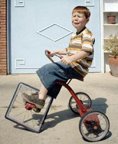Per Velonews.com:
Perhaps not surprisingly, German media have slammed Jan Ullrich after reports that DNA samples have definitively linked the 1997 Tour de France champion to several packets of blood seized during police raids of properties owned by Spanish doctor Eufemiano Fuentes.
Ullrich, 33, retired last month, after his career evaporated due to his link to the Spanish investigation dubbed Operación Puerto. Ullrich has maintained his innocence throughout and continued to do so after a Bonn prosecutor announced results of DNA tests on Tuesday. A glance at headlines from Germany's major news outlets, however, suggests that Ullrich's defense doesn't have much traction.
In Wednesday's edition, the popular daily newspaper Bild wrote, "German sport definitely loses one of its heroes," under the headline: "Jan Ullrich the Liar."
Another editorial in the same paper noted, "Ullrich forever destroys his own myth," and continued with, "We don't want to hear anymore of your stories. Jan, in short it's simply unbearable and embarrassing."
Ullrich had initially fought attempts to secure a DNA sample for comparison to blood in nearly 200 bags seized in raids on Fuentes property last May. Under legal pressure, Ullrich supplied a saliva sample and on Tuesday, prosecutors announced that the test confirmed that the blood in nine of the pouches - variously labeled "Jan," "N.1" and "Rudy's son" - belong to Ullrich.
Despite the revelation, Ullrich continued to deny any link to Fuentes, suggesting through his attorney that the tests may have been manipulated, a claim investigating prosecutor Friedrich Apostel characterized as "not within the realm of possibility."
German newspapers apparently had no doubts about the veracity of the test and were ruthless in what they consider irrefutable evidence that Ullrich did know and work with Fuentes.
"On thing is now clear," wrote the Berliner Zeitung. "Ullrich lied." Apostel said that charges could be filed "soon" now that the blood has been directly tied to the former T-Mobile star. Indeed, both Ullrich and his former coach Rudy Pevenage could be charged under the provisions of a German law regulating medical procedures, although Apostel cautioned he was not certain as to precisely when charges may be filed, since he is reviewing additional evidence in the case.
With the absence of a specific German anti-doping statute, the court in Bonn is also examining a fraud complaint brought against Ullrich by Britta Bannenberg, a former athlete and now a criminologist at the University of Bielefeld.
A Spanish judge last month closed legal proceedings because he said prosecutors couldn't prove that anyone broke existing laws. The judge said there was no evidence that Fuentes and Merino were "endangering public health," the only charges they could have been charged with, since Spain, like Germany, lacked a specific anti-doping law at the time of the Puerto investigation.
A new stricter anti-doping law - which makes it illegal to administer, procure and accept doping treatments of performance-enhancing products - wasn't signed into law until February and couldn't be applied to the Puerto case, the judge ruled.
T-Mobile: Disappointed but not surprised
Ullrich's former team, T-Mobile, expressed disappointment in the results of the DNA test released Tuesday.
Ullrich was fired by T-Mobile almost immediately after he was named in the Puerto case and the ensuing controversy resulted in a complete management shake-up at Germany's biggest cycling team. The team is now managed by American Bob Stapleton.
"I'm disappointed that Jan has been forced to end his career on such a bad note," T-Mobile spokesman Christian Frommert said in an interview with Germany's N24 news network. "I'm disappointed, but unfortunately, I'm not surprised."
"When we decided to pull Jan Ullrich from the team for the 2006 Tour de France, he insisted that the information we had was wrong and that had never been in contact with Fuentes," Frommert noted. "Today's information from Bonn refutes that claim."
Others named
At this point, Ullrich is the one rider to have faced the most serious consequences of the Puerto case. He's both lost his job and now faces possible criminal charges.
Ivan Basso, winner of last year's Giro d'Italia, was the other big name implicated in Puerto. Like Ullrich, Basso was ultimately left his team, the Danish CSC squad, headed by 1996 Tour winner, and former T-Mobile star, Bjarne Riis. Basso, however, quickly locked in a new contract with Discovery when the Italian Olympic Committee dropped disciplinary procedures against him, concluding that it lacked sufficient evidence to proceed.
Basso has not submitted to a DNA test, but did issue a carefully worded statement indicating that he would in the event of a "national judicial or disciplinary investigation," neither of which appears to be likely in his case.
Last May, news reports also linked American Tyler Hamilton to Fuentes. The Spanish daily El País reproduced several of Fuentes record books in which Hamilton was allegedly identified by the code, "4142." Hamilton, who was finishing a two-year suspension for blood-doping, vigorously denied the allegations outlined in the El País articles.
Hamilton allegedly tested positive for homologous blood-doping - the injection of another person's red blood cells - at the 2004 Olympics in Athens, but that result was negated after laboratory personnel froze the B-sample, which is required for confirmation of a positive. Hamilton, however, was again tested following his time trial stage victory at the 2004 Vuelta a España and that result was ultimately confirmed.
Barred from riding on a ProTour team for another two years, Hamilton now rides for the Russian/Italian Tinkoff Credit Systems team and is slated to mark his return to American racing later this month at the Tour de Georgia.
Other riders whose names appeared in the Puerto documents, such as Oscar Sevilla, Paco Mancebo and Santiago Botero, have been forced to take major pay cuts and are now riding for second-tier teams.
Another dozen riders, including three-time Tour de France podium finisher Joseba Beloki, remain without contracts despite their declarations of innocence.
Agence France Presse and VeloNews.com editors contributed to this report
















